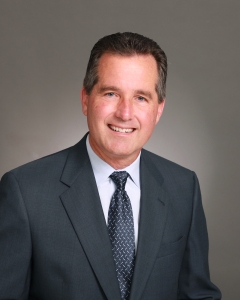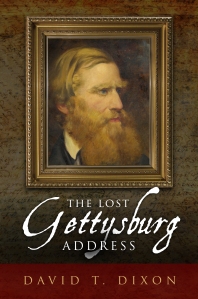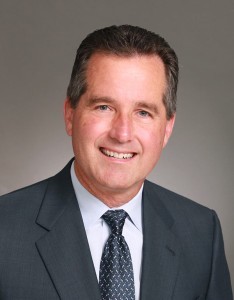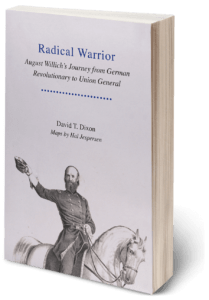Bull Runnings | A Journal of the Digitization of a Civil War Battle
Interview – David T. Dixon,”The Lost Gettysburg Address”
28012016
David Dixon is the author of The Lost Gettysburg Address, a book I thought I previewed a while back. It seems it slipped through the cracks! In brief, this is the story of the third speaker on the program for the dedication of the Gettysburg National Cemetery in November, 1863, Charles Anderson. Mr. Dixon took some time to answer a few questions about himself and his book. Read on!
————————————-
 BR: Can you tell us a little bit about yourself?
BR: Can you tell us a little bit about yourself?
DTD: I became fascinated with history at an early age, when my father gave me a copy of the historical fiction classic Northwest Passage, by Kenneth Roberts. Throughout my adult life, I served on the boards of historical societies, organized local preservation efforts, and helped create a maritime museum. After more than twenty years in marketing with Fortune 500 corporations, I went back to school and earned his M.A. in history from the University of Massachusetts in 2003. Since then I have published numerous articles in scholarly journals and magazines. Most focus on black history and on Union sympathizers in the Civil War South. They are available for free download at my website, B-List History. My biography of U.S. and Confederate congressman Augustus R. Wright appeared in The Georgia Historical Quarterly in 2010. I am most intrigued by the vexing problem of defining “loyalty” in the context of the American Civil War.
BR: What got you interested in the Civil War? Who were your early influences?
DTD: When my father passed away at a young age, I began to examine his family history and found that a number of his ancestors were Southern Union men. This really surprised me, since my great grandmother was involved in a Georgia chapter the United Daughters of the Confederacy. I had no idea that there was so much active dissent on the Confederate home front. I began reading voraciously on that subject. Scholars writing about Southern Union men and their families such as Carl Degler, William W. Freehling, Daniel Sutherland, John Inscoe and many others helped me understand this lesser-known side of the Civil War. Coincidentally, the late Thomas Dyer of the University of Georgia was finishing Secret Yankees: The Union Circle in Confederate Atlanta around the same time as I was doing research for my M.A. thesis, Civil War Unionism in Floyd County, Georgia. Dyer’s book is wonderful and remains my favorite in the sub-genre.
BR: Why the interest in Charles Anderson?
DTD: I stumbled upon Anderson quite by accident. He had been in my idea file due to his progressive views on racial equality and his denial of the generally accepted notion (in his day) of white Anglo-Saxon supremacy. I planned to write a short article about him, but as I started to research him I found many interesting story lines. Once I saw a brief article on the discovery of the lost Gettysburg speech, I was hooked. Anderson is a character who deserves a scholarly biography.
BR: Can you briefly describe the discovery of the document in question?
DTD: Rob Tolley, a lecturer in anthropology at Indiana University, befriended Anderson’s great grandson, Bartley Skinner. One day, several cardboard boxes containing Anderson’s papers arrived at the Skinner ranch in a remote area of western Wyoming. Among the hundreds of letters and documents that Skinner asked Tolley to identify, catalogue and donate was a 39 page speech, handwritten on a gray, lined legal pad. Tolley donated Anderson’s speech to the Ohio Historical Society without knowing its importance. A few years after he donated the item, he determined that it was indeed the long-lost manuscript of Anderson’s Gettysburg oration. I took part in the thrill of discovery last year, when asked by Rob to help identify a number of documents yet to be donated. Among these were eight draft pages of the speech. We have arranged to donate these drafts to the Gettysburg National Military Park. We hope to bring more attention to the third major address at Gettysburg. In my book, I argue that one must consider all three major speeches at the Gettysburg dedication (Everett, Lincoln, and Anderson) as a rhetorical ensemble. Each had a distinct purpose. Those purposes were not only to honor the dead Union soldiers, but they were also expressly political.
BR: How does an understanding of Anderson better our understanding of his times?
DTD: Anderson was one of the most outspoken Southern Union men of his day. He was a slave owner who risked everything on numerous occasions due to his loyalty to the Union. This devotion to Union, as Gary Gallagher describes so well in his book, The Union War, was the overwhelming factor in motivating loyal men, north and south, to risk their lives and fortunes to support Lincoln’s war effort. Anderson’s experiences as a Union man who lived in both the north and the south in the critical years leading up to the war, supports Gallagher’s thesis. In Anderson’s life story, one can trace both the origins of this strong allegiance to Union, as well as the challenges that Southern men faced, in particular, to stay true to their country.
BR: Can you describe how long it took to write the book? Was there anything that you discovered along the way that surprised you? When did you know you were “done”?
DTD: The research took about 15 months, and then another 4 months to complete the manuscript, all while holding down my day job. What surprised me the most, besides the incredible adventures of Anderson himself, was the wealth of primary sources available to help me tell Anderson’s life story. Hundreds of family letters, dozens of speeches, parts of his personal library, diaries of his daughters, newspaper reports, photographs – you name it, it was there for my inspection. This allowed me to paint an intimate portrait of this unusual character with some sense of certainty. In many ways, Anderson tells his own life story and I simply moderate and add historical context. I knew I was “done”, if one can ever really be done, when the entire narrative felt complete and was well-supported by primary sources.
BR: Can you describe your research and writing process?
DTD: Most non-fiction authors whom I know enjoy the research part of the book-writing process the most. I was very fortunate to begin this project early in 2014. With so many archival indexes now online, I was able to make my trips to various libraries and archives in Ohio, Kentucky, Tennessee and Texas organized and efficient. I was also lucky that the largest collection of Anderson papers resides at the Huntington Library in San Marino, California, about 80 miles from my home. Many historians will tell you that the Huntington is a Mecca for 19th century American history research.
My process involved several steps. First, I tried to locate and get my hands on every shred of primary source material I could find. Second, I developed a detailed chronological timeline of important events in Anderson’s life. At this point, a number of compelling story lines emerged and I constructed detailed outlines for each. Some stories were worth only one chapter, but others, like Andersons’s role in the secession drama in Texas, ended up as several chapters. After I organized my data and thoughts in this way, I poured over relevant secondary sources, adding context to the timeline and outlines. I then wrote the chapters I felt most prepared to write first, with the idea that they should be able to stand on their own – small stories within the larger narrative. Once I had peer reader feedback and had revised at least a dozen times, I turned the manuscript over to the professional editors and copywriters for the “red ink” treatment. It is an arduous process, but tremendously rewarding.
BR: How has the book been received so far?
 DTD: I am happy to report that the book has been received very well by reviewers in several of the important Civil War blogs and magazines. I was especially pleased to read Civil War News Book Review Editor Ed Bonekemper’s comments. He said, “It’s amazing that stimulating and informative Civil War books with whole new perspectives keep coming out of the woodwork. This one makes it a pleasure to be a book review editor and reviewer.” I have never met Ed, but I feel that I owe him an adult beverage at the very least.
DTD: I am happy to report that the book has been received very well by reviewers in several of the important Civil War blogs and magazines. I was especially pleased to read Civil War News Book Review Editor Ed Bonekemper’s comments. He said, “It’s amazing that stimulating and informative Civil War books with whole new perspectives keep coming out of the woodwork. This one makes it a pleasure to be a book review editor and reviewer.” I have never met Ed, but I feel that I owe him an adult beverage at the very least.
BR: What’s next for you?
DTD: The book launched recently, so I am really focused on getting the news about the lost speech and Anderson’s story out to a broad audience over the next year at least. My calendar is filling up with speaking engagements at round tables, historical societies, and conferences. I really enjoy sharing the story with these intelligent audiences, and this will take up much of my time for the balance of 2016. When I do embark on the next book, it will need to meet several criteria: The story has to be one that has not been told. There has to be a large collection of primary sources available. Finally, the main character or characters need to have a close connection with an important event or series of events. The Lost Gettysburg Address sets a very high bar for me in terms of these essential elements. I would rather wait until I find another amazing untold story like this one, rather than spend my time on previously plowed ground. I have been approached with a few ideas, but none of them meets all my requirements. So, for now, I will continue to talk and write about Charles Anderson and his compelling life story – at least until my wife decides to kick his ghost out of our house.


